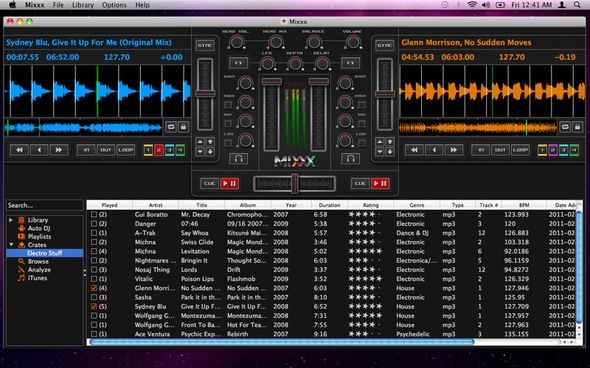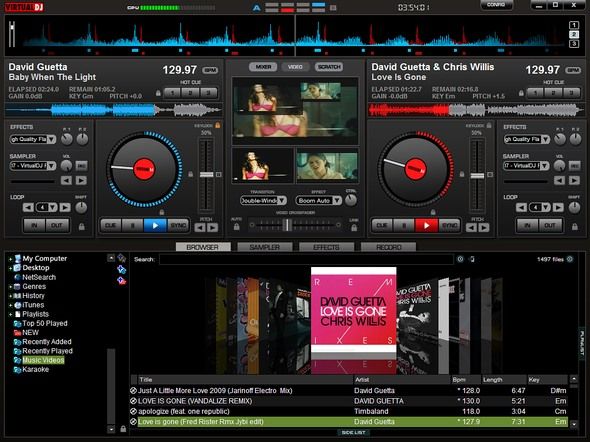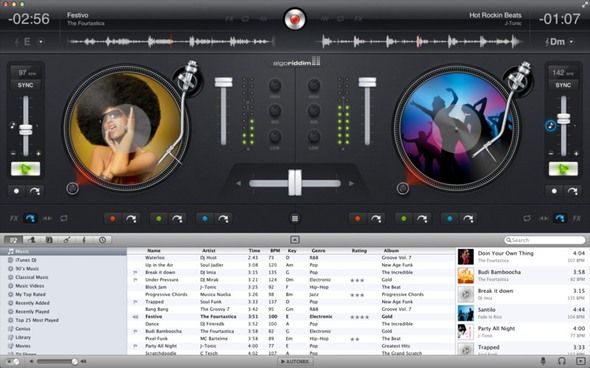I’ve got a thing for vinyl, especially white labels. If it’s dusty, dubiously labelled and going for a couple of dollars then I absolutely have to buy it. Digital DJing takes some of the fun out of the pastimes associated with DJing, but then again it also adds another layer of accessibility that manual turntablism doesn’t have.
For starters, there’s a range of software to suit every level of skill. You can invest big in some additional hardware to control your virtual turntable, or you can play it cool with cheap, cheerful and even free low-level mixing apps.
Today we’ll be taking a look at some of the best solutions around, with some impressive free options and slightly more advanced paid solutions too.
Mixxx (Free)
The most complete free DJ software available today, Mixxx is a great place to start if you’re a beginner, intermediate or even experienced DJ who values quality open source software. The software is freely available to anyone with a capable PC running Windows, Mac OS X (10.5+) or Linux, with additional binaries available for Ubuntu.
For beginners, there’s is ample support available, which is great because the number of features might be a little daunting at first. There is special guidance for newbies included in the full user manual which also contains information regarding hardware controller support and the advanced functions found in Mixxx. In addition to this, the wiki, FAQ and community support forums are bound to address any other issues, making Mixxx very newbie-friendly indeed.
http://www.youtube.com/watch?v=axlW5Q_8y6c
In addition to library management, BPM detection and scratchable turntables (the bare essentials for a DJ package) there are some far more advanced tools available if you know what you’re doing. This includes a wavetable, beat detection with looping, multiple hotcues and pitch bend. In addition there are four sample decks ready for use and the software supports a vast range of formats including MP3, MP4/AAC, OGG, WAV and even FLAC. For free, you really can’t complain.
Download: Mixx (Windows/Mac/Ubuntu/Linux Source)
Virtual DJ Home Edition (Free)
Virtual DJ make a range of DJ software, and that software isn’t particularly cheap. The full version of Virtual DJ will set you back $299, but there’s also a free version available under the “Home” label. As you would expect for premium software, this free version is rather limited in its scope, but comes with plenty of features to start you off. Virtual DJ Home is available for Windows and Mac OS X 10.5+, with unfortunately no support for Linux.
According to the product comparison page, there is support for a maximum of 99 decks, BPM detection with full beat-matching capabilities, automatic gain control, looping, sampling and effects. There is also that all important recording facility, so you can save your mix - though broadcast has been stripped out of the home version and is instead found in Virtual DJ Broadcaster for $49 instead.
http://www.youtube.com/watch?v=g0Fn7-jBVFA
Much like Mixxx, there are ample support options, though these fall short of being as user friendly as the aforementioned open source offering. If you’re looking for help there’s a wiki, forums, though many of the topics refer to things that aren’t available in the free version. There’s also no support for hardware in this version, unless you get a bundled OEM version with the purchase of a controller.
Download: Virtual DJ Home (Windows/Mac)
Algoriddim djay ($0.99 iPhone, $19.99 Mac/iPad)
If you have an iOS device and a vague interest in DJing then there’s a very good chance you’re already familiar with djay. It’s pretty much the premier mixing app for Apple’s mobile platform, and if you’ve got an iPhone you can pick up an absolute bargain at $0.99, a "special" price the app has been at for over a year now. Mac and iPad owners can also play along, with their respective versions costing $19.99 each.
You probably won’t find a better looking DJ app, and you’d be hard-pressed to find one that’s easier to use and learn on. I’ve personally had the iPhone version for a while now, and I love it so much that I bought the split-cable that enables proper pre-cueing. In addition to this there are an array of features like beatmatching, loop control and some great sounding effects for perfect transitions.
http://www.youtube.com/watch?v=E2KEVUmYKCA
Add all the features that come with iOS including iCloud support, AirPlay for broadcasting your mix to the nearest receiver as well as iTunes library access and you’ve got one complete solution for party DJs. There is even a compatible Numark iDJ hardware interface for taking total, tactile control of your mix.
Download: Algoriddim djay (Mac/iOS)
Also Consider: itDJ (Free)
A Mac-only DJ app that doesn’t cost a penny, itDJ boasts about being “developed on a Mac for a Mac” and having complete iTunes library support. The interface won’t win any awards but the core functionality is there - BPM detection, beat matching, effects, sample pads and even an auto-DJ feature. Not bad for free!
Conclusion
If you’re an iPad or iPhone owner then I’d thoroughly recommend purchasing djay. It’s tremendous fun, easy to learn and capable of impressing a room full of people. If you’re approaching from a PC angle then Mixxx definitely gets the vote for being truly open source, actively developed and powerful enough for most users. If you’re looking at “professional” packages then I’d recommend some Technics 1200/1210 direct drive decks and an attic full of vinyl for those who are really serious about taking their DJ habit to the next stage.
Do you have any favourite software for DJing? Have you played with any hardware controllers? Let us know what you think about the rise of the tablet/laptop/virtual DJ in the comments, below.




